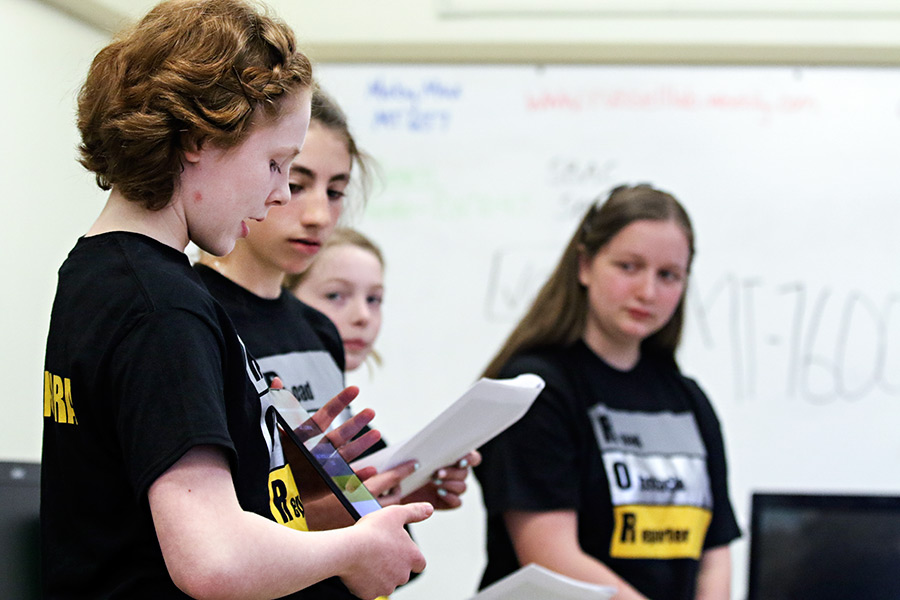Youthful Innovators
Teams from Kalispell Montana Code Girls program ready to present apps they built for state, national competition
By Molly Priddy
Elise Suda, Kelsea Bemis, and Lillian Lewis are all 11-year-old fifth-graders from Kalispell. These are basic facts — they’re girls and they’re young — but those characteristics are also what makes them powerful.
The three teammates have a solid grasp on math and a passion to solve problems in their communities, and now they have the technological tools to help them spread their specific power of change even further.
Pooling their brainpower through the Montana Code Girls program, the teammates wrote the code and designed the graphics necessary not only to build an app, but an app that teaches multiplication to second- and third-graders.
“This makes learning multiplication fun,” the team said.
Montana Code Girls is an offshoot program from the Big Sky Code Academy seeking to connect girls and young women with technology. Last fall, the Kalispell branch began free coding classes for girls ages 9 to 19. In January, the girls started working on their projects for the Technovation Challenge, a global competition for Code Girls and the apps they create to solve problems in their communities. The winners receive scholarships and other prizes.
Last week, the girls were one of three teams of Kalispell CodeGirls who presented their apps to venture capitalist Liz Marchi, the fund coordinator for the Frontier Angel Fund LLC, located in Polson. As a venture capitalist, Marchi and the fund invest in companies to help both the investors and entrepreneurs succeed.
The teams had to present their apps, give the reason they created them, show a video about their app, and then demonstrate it for Marchi and Devin Holmes, who founded Montana Code Girls with his wife, Christine. Holmes said the practice round was a good idea, because not only did the girls get to test run their apps, but they had a chance to practice public speaking as well.
Fans of the TV show “Shark Tank” would have seen similarities, which is why Marianne Smith, the Kalispell volunteer who started up the local Code Girls branch, called the presentations “Minnow Tank.”
“We didn’t want to scare the girls,” Smith said about the name.
Along with the math app, another team consisting of fifth-graders Isabelle Ashley, Taylor Pooton, and Makayla Devenport built an app called “Word Keys” to help younger kids with spelling and pronunciation. The middle-school group, made up of Lilly Schroeder, Hannah Pieri, Alexandra Houseworth, and Jaclyn Green, developed an app called Road Obstacle Reporter, which allows a driver to record the location of a pothole or other obstacle in the road and report it to the proper agency.
Marchi was impressed with the apps and the work the girls put into them, and said she likes to support programs that push girls to think and create.
“Innovation is about solving problems,” Marchi said.
On May 13, the Kalispell Code Girls will head to Helena for the State Technovation Challenge Competition, where they will pit their apps against those from teams across the state for a chance to win up to a $1,000 scholarship and other prizes.
Smith said that because this was the first year for the program, there are a few wrinkles to iron out. For example, in order for the competition to be sanctioned for the global competition, at least 10 teams have to compete. There aren’t that many on task yet in Montana, Smith said.
“All the girls who have made the deadline — Bozeman and us — will throw our pitches into the general pool that doesn’t have (state) competitions,” Smith said.
After that, the girls will compete nationally.
“I’m really proud of them,” Smith said. “It was just really great.”
“I don’t think they’ll ever have an experience this close (to real-world scenarios) at school,” she added.
When it came time to decide what kind of app they’d like to build, the girls had big ideas, Smith said. Volunteers Liz Bernau, Beth Schecher, and Leah Venegas helped provide the knowledge framework, while the girls learned that coding is behind everything they see on their phone and computer screens.
In fact, that was probably the biggest lesson they learned through this whole endeavor, the girls said.
“Once we learned how coding worked, we had a great appreciation for Minecraft,” Kelsea Bemis said of their favorite computer game.
Bemis, Suda and Lewis worked well together, tackling the coding and designing as a team.
“I probably wouldn’t be able to figure it out by myself,” Bemis said, standing with her teammates.